Entrepreneurship and Small Business Management: UK Analysis
VerifiedAdded on 2020/12/30
|17
|4470
|359
Report
AI Summary
This report provides a comprehensive analysis of entrepreneurship and small business management, particularly focusing on the UK economy. It examines different types of entrepreneurial ventures, highlighting their similarities and differences, and presents statistical data illustrating the impact of micro and small businesses on the UK's economy. The report also explores the importance of small businesses and start-ups in the growth of the social economy, along with the skills and characteristics of successful entrepreneurs. Furthermore, it reflects on how different aspects of an entrepreneurial personality influence motivation and mindsets, and discusses the background and experiences that can either hinder or foster entrepreneurship, providing a holistic view of the entrepreneurial landscape in the UK. The report concludes by summarizing key findings and emphasizing the vital role of SMEs in the UK economy.

Entrepreneurship and Small
Business Management
Business Management
Paraphrase This Document
Need a fresh take? Get an instant paraphrase of this document with our AI Paraphraser
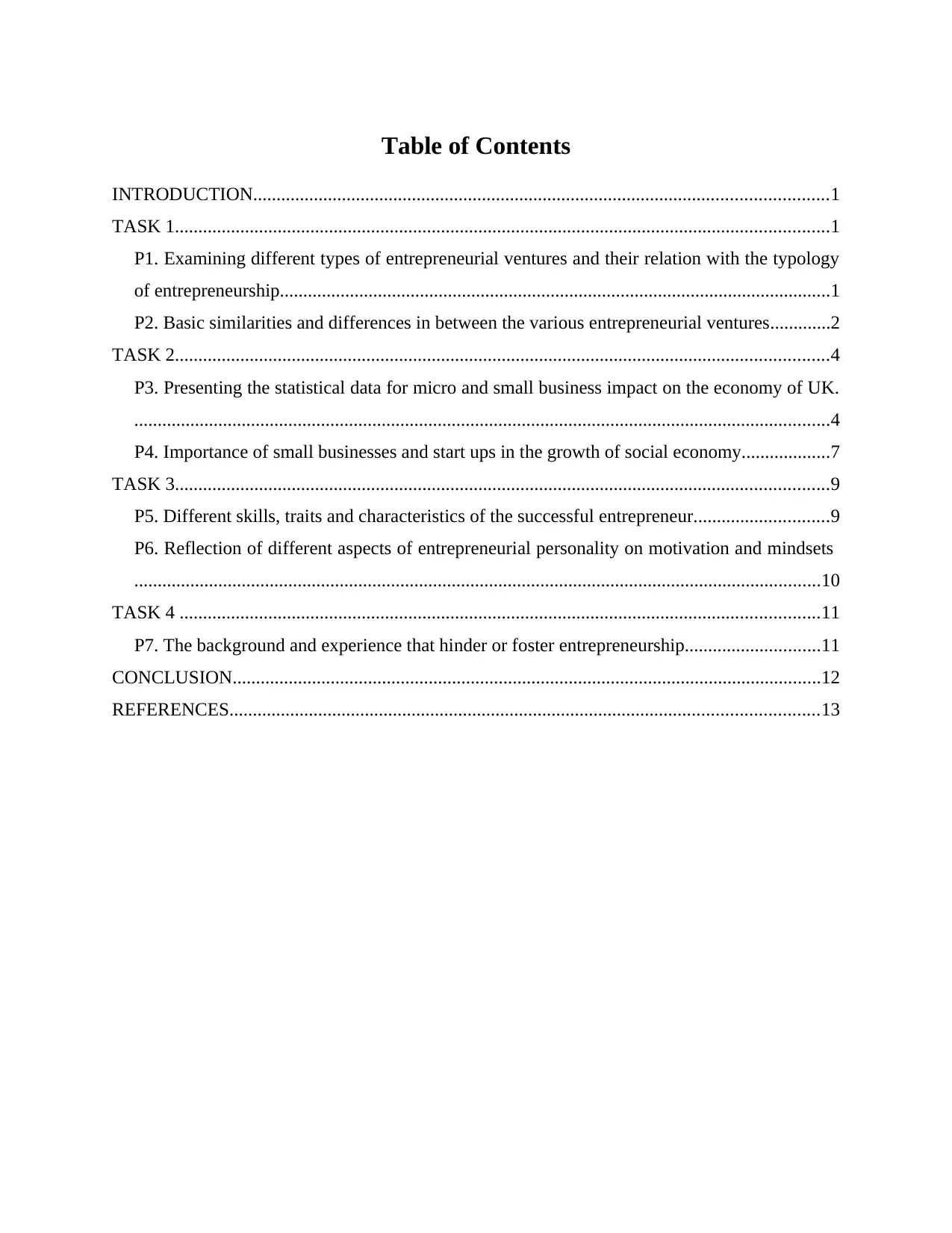
Table of Contents
INTRODUCTION...........................................................................................................................1
TASK 1............................................................................................................................................1
P1. Examining different types of entrepreneurial ventures and their relation with the typology
of entrepreneurship......................................................................................................................1
P2. Basic similarities and differences in between the various entrepreneurial ventures.............2
TASK 2............................................................................................................................................4
P3. Presenting the statistical data for micro and small business impact on the economy of UK.
.....................................................................................................................................................4
P4. Importance of small businesses and start ups in the growth of social economy...................7
TASK 3............................................................................................................................................9
P5. Different skills, traits and characteristics of the successful entrepreneur.............................9
P6. Reflection of different aspects of entrepreneurial personality on motivation and mindsets
...................................................................................................................................................10
TASK 4 .........................................................................................................................................11
P7. The background and experience that hinder or foster entrepreneurship.............................11
CONCLUSION..............................................................................................................................12
REFERENCES..............................................................................................................................13
INTRODUCTION...........................................................................................................................1
TASK 1............................................................................................................................................1
P1. Examining different types of entrepreneurial ventures and their relation with the typology
of entrepreneurship......................................................................................................................1
P2. Basic similarities and differences in between the various entrepreneurial ventures.............2
TASK 2............................................................................................................................................4
P3. Presenting the statistical data for micro and small business impact on the economy of UK.
.....................................................................................................................................................4
P4. Importance of small businesses and start ups in the growth of social economy...................7
TASK 3............................................................................................................................................9
P5. Different skills, traits and characteristics of the successful entrepreneur.............................9
P6. Reflection of different aspects of entrepreneurial personality on motivation and mindsets
...................................................................................................................................................10
TASK 4 .........................................................................................................................................11
P7. The background and experience that hinder or foster entrepreneurship.............................11
CONCLUSION..............................................................................................................................12
REFERENCES..............................................................................................................................13

Illustration Index
Illustration 1: data for various SMEs...............................................................................................5
Illustration 2: Revenue from SMEs................................................................................................6
Illustration 3: Employment in UK...................................................................................................7
Illustration 1: data for various SMEs...............................................................................................5
Illustration 2: Revenue from SMEs................................................................................................6
Illustration 3: Employment in UK...................................................................................................7
⊘ This is a preview!⊘
Do you want full access?
Subscribe today to unlock all pages.

Trusted by 1+ million students worldwide
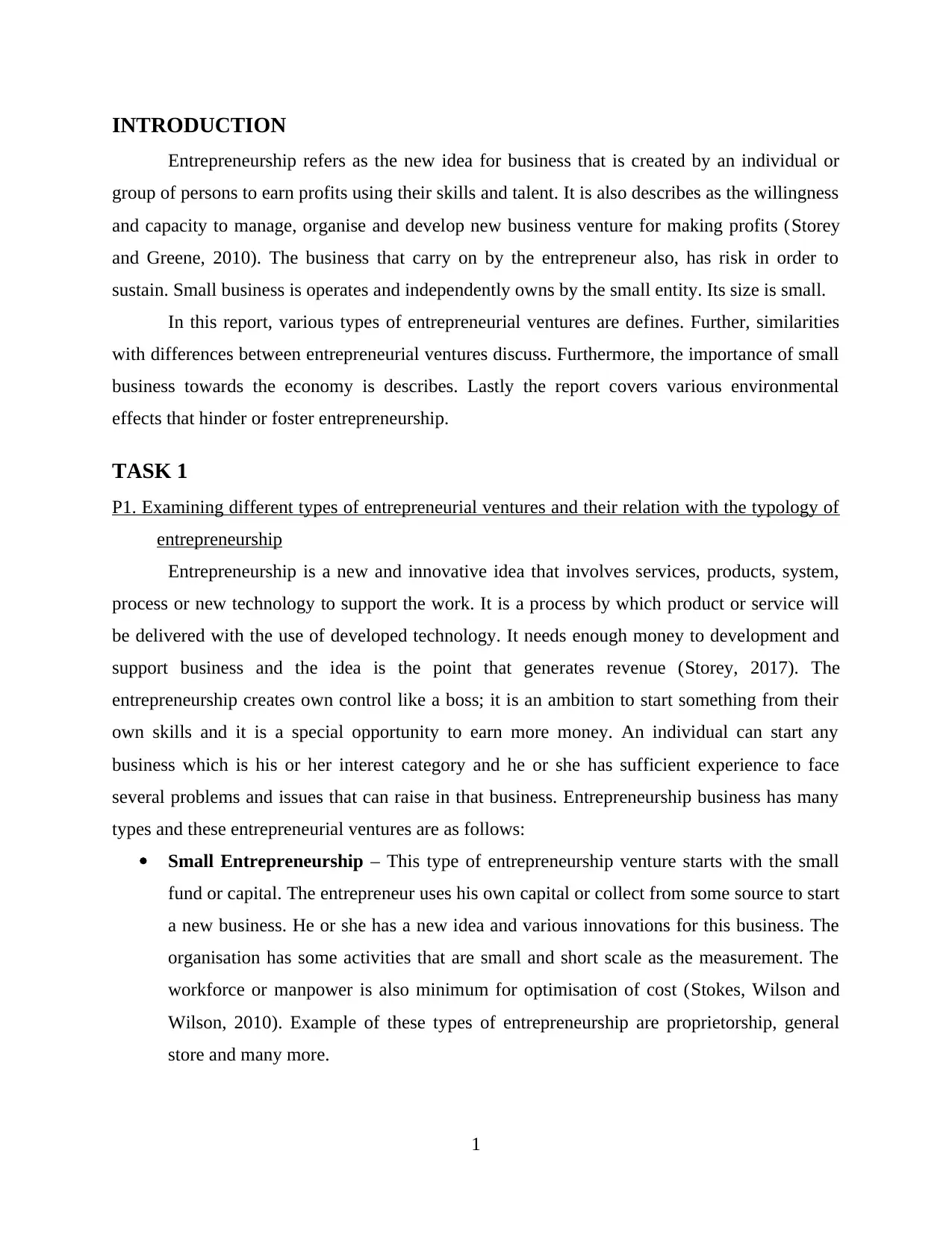
INTRODUCTION
Entrepreneurship refers as the new idea for business that is created by an individual or
group of persons to earn profits using their skills and talent. It is also describes as the willingness
and capacity to manage, organise and develop new business venture for making profits (Storey
and Greene, 2010). The business that carry on by the entrepreneur also, has risk in order to
sustain. Small business is operates and independently owns by the small entity. Its size is small.
In this report, various types of entrepreneurial ventures are defines. Further, similarities
with differences between entrepreneurial ventures discuss. Furthermore, the importance of small
business towards the economy is describes. Lastly the report covers various environmental
effects that hinder or foster entrepreneurship.
TASK 1
P1. Examining different types of entrepreneurial ventures and their relation with the typology of
entrepreneurship
Entrepreneurship is a new and innovative idea that involves services, products, system,
process or new technology to support the work. It is a process by which product or service will
be delivered with the use of developed technology. It needs enough money to development and
support business and the idea is the point that generates revenue (Storey, 2017). The
entrepreneurship creates own control like a boss; it is an ambition to start something from their
own skills and it is a special opportunity to earn more money. An individual can start any
business which is his or her interest category and he or she has sufficient experience to face
several problems and issues that can raise in that business. Entrepreneurship business has many
types and these entrepreneurial ventures are as follows:
Small Entrepreneurship – This type of entrepreneurship venture starts with the small
fund or capital. The entrepreneur uses his own capital or collect from some source to start
a new business. He or she has a new idea and various innovations for this business. The
organisation has some activities that are small and short scale as the measurement. The
workforce or manpower is also minimum for optimisation of cost (Stokes, Wilson and
Wilson, 2010). Example of these types of entrepreneurship are proprietorship, general
store and many more.
1
Entrepreneurship refers as the new idea for business that is created by an individual or
group of persons to earn profits using their skills and talent. It is also describes as the willingness
and capacity to manage, organise and develop new business venture for making profits (Storey
and Greene, 2010). The business that carry on by the entrepreneur also, has risk in order to
sustain. Small business is operates and independently owns by the small entity. Its size is small.
In this report, various types of entrepreneurial ventures are defines. Further, similarities
with differences between entrepreneurial ventures discuss. Furthermore, the importance of small
business towards the economy is describes. Lastly the report covers various environmental
effects that hinder or foster entrepreneurship.
TASK 1
P1. Examining different types of entrepreneurial ventures and their relation with the typology of
entrepreneurship
Entrepreneurship is a new and innovative idea that involves services, products, system,
process or new technology to support the work. It is a process by which product or service will
be delivered with the use of developed technology. It needs enough money to development and
support business and the idea is the point that generates revenue (Storey, 2017). The
entrepreneurship creates own control like a boss; it is an ambition to start something from their
own skills and it is a special opportunity to earn more money. An individual can start any
business which is his or her interest category and he or she has sufficient experience to face
several problems and issues that can raise in that business. Entrepreneurship business has many
types and these entrepreneurial ventures are as follows:
Small Entrepreneurship – This type of entrepreneurship venture starts with the small
fund or capital. The entrepreneur uses his own capital or collect from some source to start
a new business. He or she has a new idea and various innovations for this business. The
organisation has some activities that are small and short scale as the measurement. The
workforce or manpower is also minimum for optimisation of cost (Stokes, Wilson and
Wilson, 2010). Example of these types of entrepreneurship are proprietorship, general
store and many more.
1
Paraphrase This Document
Need a fresh take? Get an instant paraphrase of this document with our AI Paraphraser
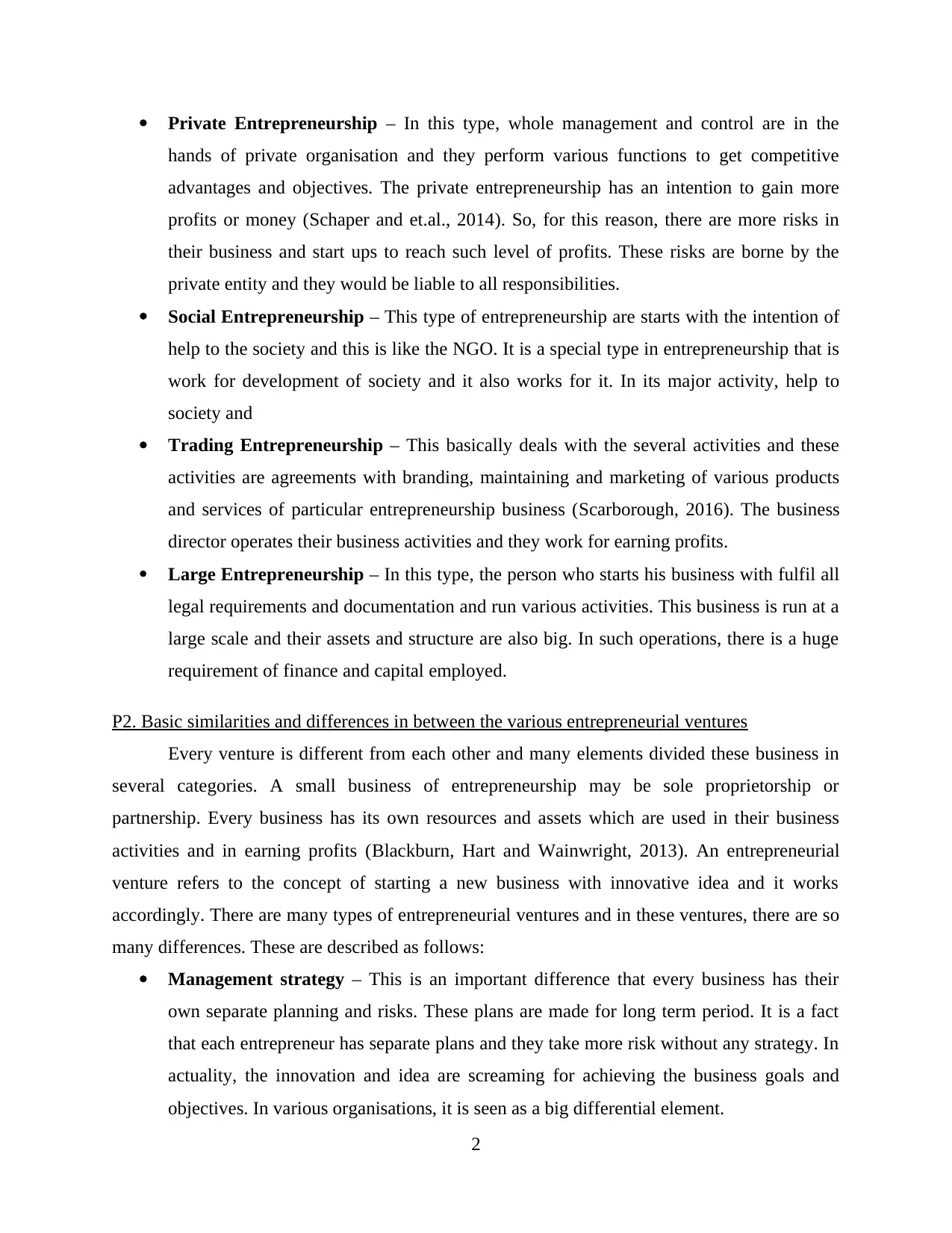
Private Entrepreneurship – In this type, whole management and control are in the
hands of private organisation and they perform various functions to get competitive
advantages and objectives. The private entrepreneurship has an intention to gain more
profits or money (Schaper and et.al., 2014). So, for this reason, there are more risks in
their business and start ups to reach such level of profits. These risks are borne by the
private entity and they would be liable to all responsibilities.
Social Entrepreneurship – This type of entrepreneurship are starts with the intention of
help to the society and this is like the NGO. It is a special type in entrepreneurship that is
work for development of society and it also works for it. In its major activity, help to
society and
Trading Entrepreneurship – This basically deals with the several activities and these
activities are agreements with branding, maintaining and marketing of various products
and services of particular entrepreneurship business (Scarborough, 2016). The business
director operates their business activities and they work for earning profits.
Large Entrepreneurship – In this type, the person who starts his business with fulfil all
legal requirements and documentation and run various activities. This business is run at a
large scale and their assets and structure are also big. In such operations, there is a huge
requirement of finance and capital employed.
P2. Basic similarities and differences in between the various entrepreneurial ventures
Every venture is different from each other and many elements divided these business in
several categories. A small business of entrepreneurship may be sole proprietorship or
partnership. Every business has its own resources and assets which are used in their business
activities and in earning profits (Blackburn, Hart and Wainwright, 2013). An entrepreneurial
venture refers to the concept of starting a new business with innovative idea and it works
accordingly. There are many types of entrepreneurial ventures and in these ventures, there are so
many differences. These are described as follows:
Management strategy – This is an important difference that every business has their
own separate planning and risks. These plans are made for long term period. It is a fact
that each entrepreneur has separate plans and they take more risk without any strategy. In
actuality, the innovation and idea are screaming for achieving the business goals and
objectives. In various organisations, it is seen as a big differential element.
2
hands of private organisation and they perform various functions to get competitive
advantages and objectives. The private entrepreneurship has an intention to gain more
profits or money (Schaper and et.al., 2014). So, for this reason, there are more risks in
their business and start ups to reach such level of profits. These risks are borne by the
private entity and they would be liable to all responsibilities.
Social Entrepreneurship – This type of entrepreneurship are starts with the intention of
help to the society and this is like the NGO. It is a special type in entrepreneurship that is
work for development of society and it also works for it. In its major activity, help to
society and
Trading Entrepreneurship – This basically deals with the several activities and these
activities are agreements with branding, maintaining and marketing of various products
and services of particular entrepreneurship business (Scarborough, 2016). The business
director operates their business activities and they work for earning profits.
Large Entrepreneurship – In this type, the person who starts his business with fulfil all
legal requirements and documentation and run various activities. This business is run at a
large scale and their assets and structure are also big. In such operations, there is a huge
requirement of finance and capital employed.
P2. Basic similarities and differences in between the various entrepreneurial ventures
Every venture is different from each other and many elements divided these business in
several categories. A small business of entrepreneurship may be sole proprietorship or
partnership. Every business has its own resources and assets which are used in their business
activities and in earning profits (Blackburn, Hart and Wainwright, 2013). An entrepreneurial
venture refers to the concept of starting a new business with innovative idea and it works
accordingly. There are many types of entrepreneurial ventures and in these ventures, there are so
many differences. These are described as follows:
Management strategy – This is an important difference that every business has their
own separate planning and risks. These plans are made for long term period. It is a fact
that each entrepreneur has separate plans and they take more risk without any strategy. In
actuality, the innovation and idea are screaming for achieving the business goals and
objectives. In various organisations, it is seen as a big differential element.
2

Operations and function – It is the main difference in between various kinds of public,
private and social entrepreneurship that such businesses are better in their functional and
operational activities and their attributes different from each other (Bridge and O'Neill,
2012). Public entrepreneurship ventures work for the development and growth of whole
country while private works in a particular urban area.
Leadership traits – Every type of venture is highly motivated and influential leadership
is able for maintaining and controlling the management their organizational business. It
facilitates their employees and staff members have better training and development
facilities. Many ventures have various types of leaders with different skills and qualities.
Possession – In private entrepreneurship ventures, the ownership and possession is
wholly controlled by a single person or entity (Burns, 2016). In public ventures,
ownership is governed by the legal body or several public institutions. In the social kind
ventures, sometimes it is handles by the group of person or sometimes government.
Infrastructure and profits – The public ventures operates at very large scale but it is not
in well condition and its profits are distributes in the owners with their profit sharing
ratio, this is decides in their board meeting. In other side the private ventures are run its
business activities at large level with the best infrastructure facility and the profits and
earnings are divided in their owners which are pre decided in their registration. In this
case, social entrepreneurship ventures operate for the charity and work for public welfare
so its infrastructure is average level and its profits is known as surplus which use for its
business expansion.
Employment – The private ventures provides more and more jobs for public because it
works at the large level and the wages or salary are provides excellent (Dennis, 2011).
The public entrepreneurship ventures also provides large number employment in that
particular country and social ventures provides employment at big level but there are
limited jobs in this type of ventures.
Operators or entrepreneurs – In such criteria, the private ventures are owner and
operates by the male and female entrepreneur or both. The public sector ventures are
operates by various types of people. In social entrepreneurship business, there are many
partners and owner for conducting their business activities.
3
private and social entrepreneurship that such businesses are better in their functional and
operational activities and their attributes different from each other (Bridge and O'Neill,
2012). Public entrepreneurship ventures work for the development and growth of whole
country while private works in a particular urban area.
Leadership traits – Every type of venture is highly motivated and influential leadership
is able for maintaining and controlling the management their organizational business. It
facilitates their employees and staff members have better training and development
facilities. Many ventures have various types of leaders with different skills and qualities.
Possession – In private entrepreneurship ventures, the ownership and possession is
wholly controlled by a single person or entity (Burns, 2016). In public ventures,
ownership is governed by the legal body or several public institutions. In the social kind
ventures, sometimes it is handles by the group of person or sometimes government.
Infrastructure and profits – The public ventures operates at very large scale but it is not
in well condition and its profits are distributes in the owners with their profit sharing
ratio, this is decides in their board meeting. In other side the private ventures are run its
business activities at large level with the best infrastructure facility and the profits and
earnings are divided in their owners which are pre decided in their registration. In this
case, social entrepreneurship ventures operate for the charity and work for public welfare
so its infrastructure is average level and its profits is known as surplus which use for its
business expansion.
Employment – The private ventures provides more and more jobs for public because it
works at the large level and the wages or salary are provides excellent (Dennis, 2011).
The public entrepreneurship ventures also provides large number employment in that
particular country and social ventures provides employment at big level but there are
limited jobs in this type of ventures.
Operators or entrepreneurs – In such criteria, the private ventures are owner and
operates by the male and female entrepreneur or both. The public sector ventures are
operates by various types of people. In social entrepreneurship business, there are many
partners and owner for conducting their business activities.
3
⊘ This is a preview!⊘
Do you want full access?
Subscribe today to unlock all pages.

Trusted by 1+ million students worldwide

Research and market plan – In this context, private ventures run for more profits so
their marketing plans is makes for expansion in their sales revenue. The public ventures
plan their marketing strategy for achieving growth and development of this business in
the target market (Hatten, 2012). In other side, the social ventures make their market plan
to promote and develop so for this reason their employees work properly and maintain
the business environment.
TASK 2
P3. Presenting the statistical data for micro and small business impact on the economy of UK.
In UK country, the micro and small are the key businesses for growth in their GDP.
These are the heart for its economy and it has a great impact of its operations. It contributes at
the large scale for development and growth of the nation (Hatten, 2015). There are many types of
micro, small and medium enterprises. These explains as follows :
Micro Enterprises – The business have less than 10 employees and its output is not more than
2.5 million pounds. This is run its operations at small level.
Small Enterprises – In any business, there are less than 50 manpower and turnover is less than
10 million pounds are cover in it.
Medium Enterprises – This ventures have less than 100 employees and this business has a sales
of less than 50 million pounds.
In UK nation, this chert is showing the total percentages of SMEs in UK nation :
4
their marketing plans is makes for expansion in their sales revenue. The public ventures
plan their marketing strategy for achieving growth and development of this business in
the target market (Hatten, 2012). In other side, the social ventures make their market plan
to promote and develop so for this reason their employees work properly and maintain
the business environment.
TASK 2
P3. Presenting the statistical data for micro and small business impact on the economy of UK.
In UK country, the micro and small are the key businesses for growth in their GDP.
These are the heart for its economy and it has a great impact of its operations. It contributes at
the large scale for development and growth of the nation (Hatten, 2015). There are many types of
micro, small and medium enterprises. These explains as follows :
Micro Enterprises – The business have less than 10 employees and its output is not more than
2.5 million pounds. This is run its operations at small level.
Small Enterprises – In any business, there are less than 50 manpower and turnover is less than
10 million pounds are cover in it.
Medium Enterprises – This ventures have less than 100 employees and this business has a sales
of less than 50 million pounds.
In UK nation, this chert is showing the total percentages of SMEs in UK nation :
4
Paraphrase This Document
Need a fresh take? Get an instant paraphrase of this document with our AI Paraphraser
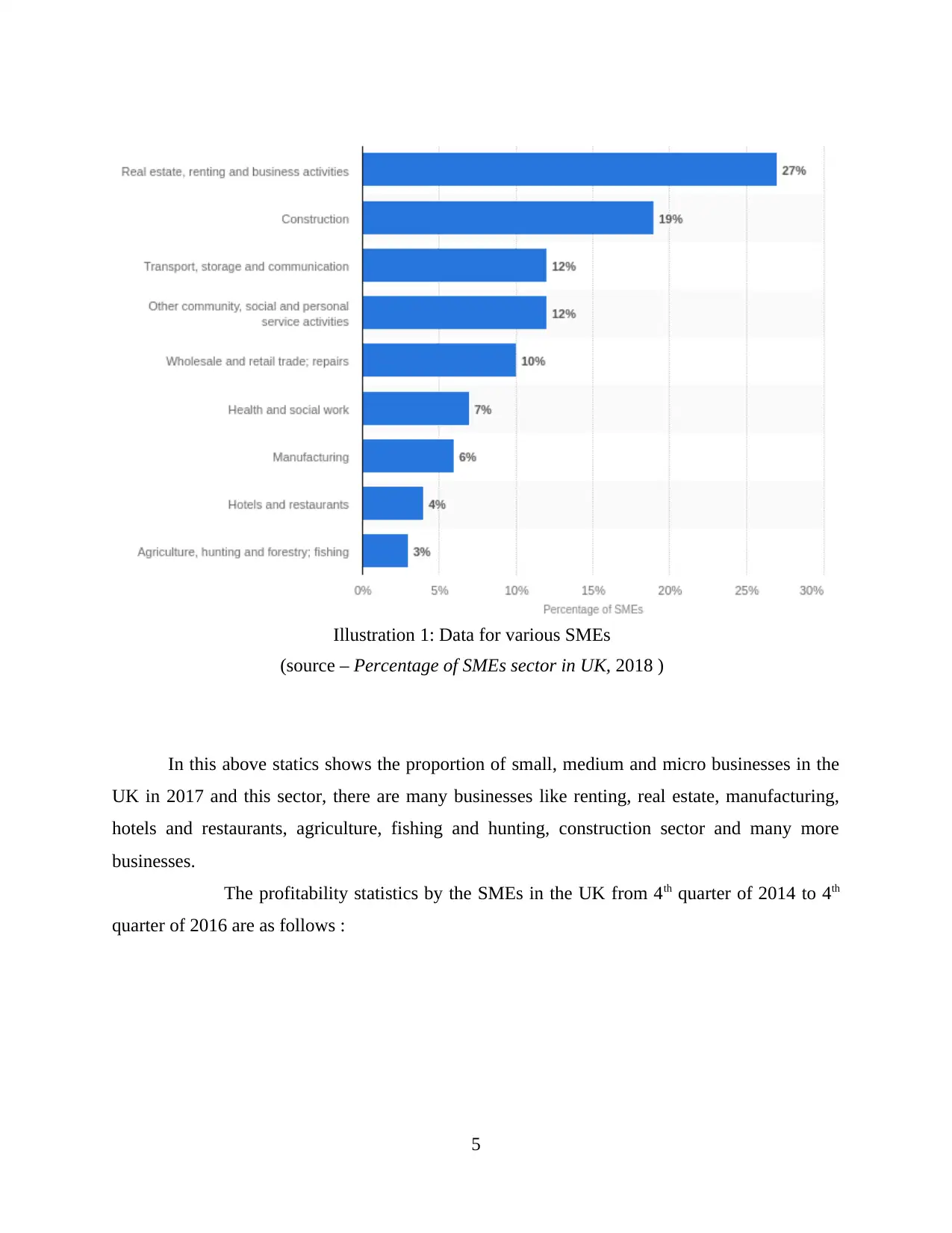
In this above statics shows the proportion of small, medium and micro businesses in the
UK in 2017 and this sector, there are many businesses like renting, real estate, manufacturing,
hotels and restaurants, agriculture, fishing and hunting, construction sector and many more
businesses.
The profitability statistics by the SMEs in the UK from 4th quarter of 2014 to 4th
quarter of 2016 are as follows :
5
Illustration 1: Data for various SMEs
(source – Percentage of SMEs sector in UK, 2018 )
UK in 2017 and this sector, there are many businesses like renting, real estate, manufacturing,
hotels and restaurants, agriculture, fishing and hunting, construction sector and many more
businesses.
The profitability statistics by the SMEs in the UK from 4th quarter of 2014 to 4th
quarter of 2016 are as follows :
5
Illustration 1: Data for various SMEs
(source – Percentage of SMEs sector in UK, 2018 )
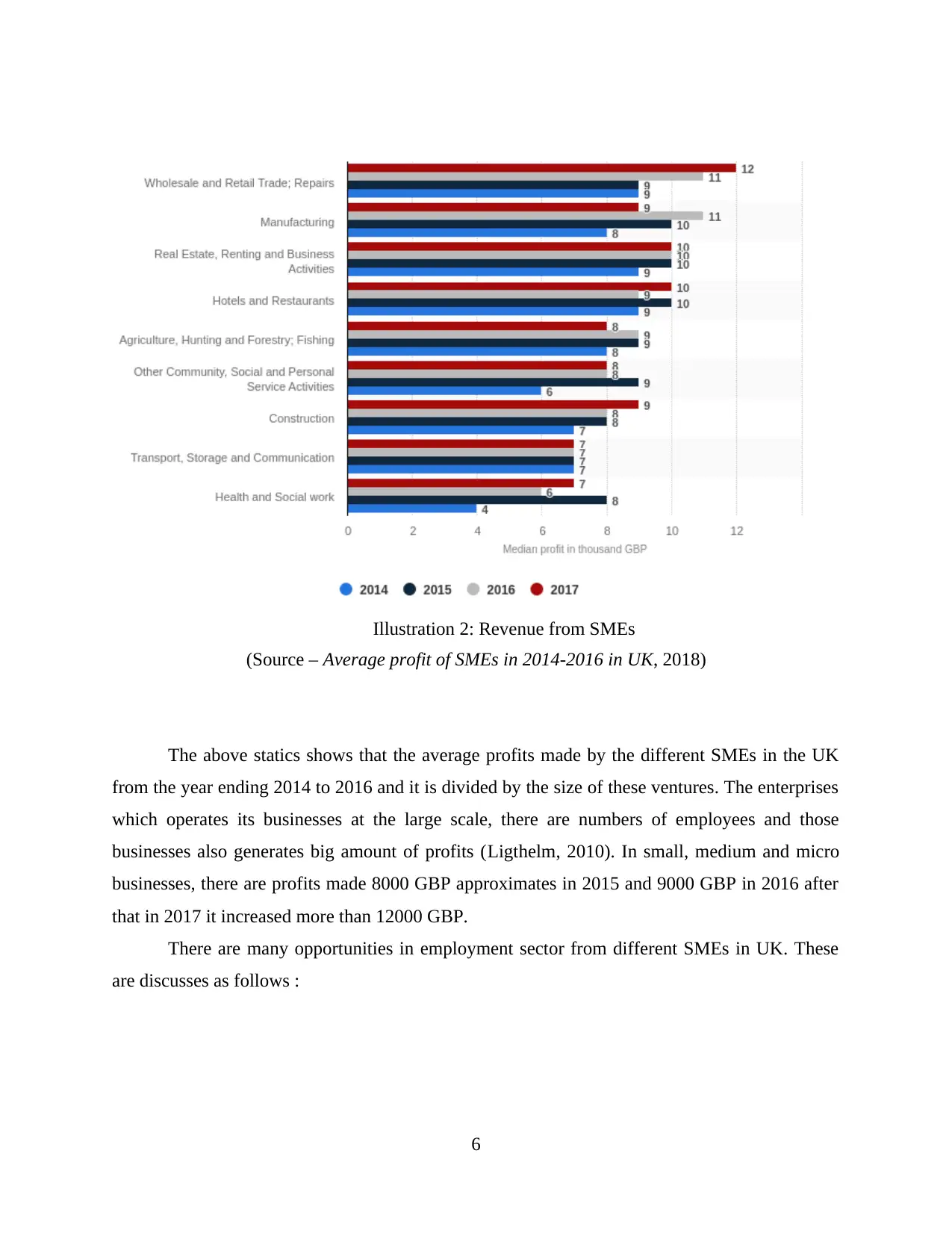
Illustration 2: Revenue from SMEs
(Source – Average profit of SMEs in 2014-2016 in UK, 2018)
The above statics shows that the average profits made by the different SMEs in the UK
from the year ending 2014 to 2016 and it is divided by the size of these ventures. The enterprises
which operates its businesses at the large scale, there are numbers of employees and those
businesses also generates big amount of profits (Ligthelm, 2010). In small, medium and micro
businesses, there are profits made 8000 GBP approximates in 2015 and 9000 GBP in 2016 after
that in 2017 it increased more than 12000 GBP.
There are many opportunities in employment sector from different SMEs in UK. These
are discusses as follows :
6
(Source – Average profit of SMEs in 2014-2016 in UK, 2018)
The above statics shows that the average profits made by the different SMEs in the UK
from the year ending 2014 to 2016 and it is divided by the size of these ventures. The enterprises
which operates its businesses at the large scale, there are numbers of employees and those
businesses also generates big amount of profits (Ligthelm, 2010). In small, medium and micro
businesses, there are profits made 8000 GBP approximates in 2015 and 9000 GBP in 2016 after
that in 2017 it increased more than 12000 GBP.
There are many opportunities in employment sector from different SMEs in UK. These
are discusses as follows :
6
⊘ This is a preview!⊘
Do you want full access?
Subscribe today to unlock all pages.

Trusted by 1+ million students worldwide
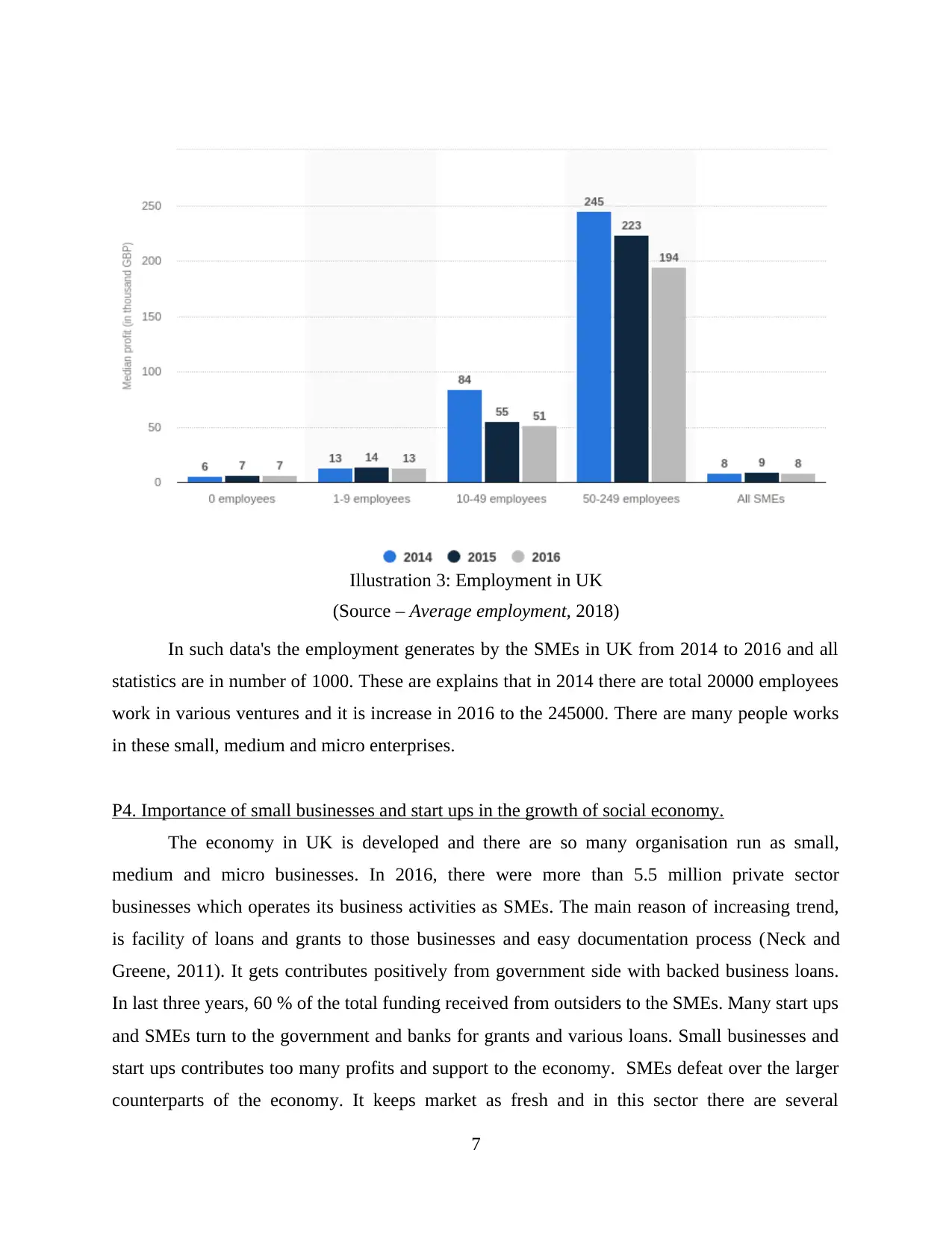
In such data's the employment generates by the SMEs in UK from 2014 to 2016 and all
statistics are in number of 1000. These are explains that in 2014 there are total 20000 employees
work in various ventures and it is increase in 2016 to the 245000. There are many people works
in these small, medium and micro enterprises.
P4. Importance of small businesses and start ups in the growth of social economy.
The economy in UK is developed and there are so many organisation run as small,
medium and micro businesses. In 2016, there were more than 5.5 million private sector
businesses which operates its business activities as SMEs. The main reason of increasing trend,
is facility of loans and grants to those businesses and easy documentation process (Neck and
Greene, 2011). It gets contributes positively from government side with backed business loans.
In last three years, 60 % of the total funding received from outsiders to the SMEs. Many start ups
and SMEs turn to the government and banks for grants and various loans. Small businesses and
start ups contributes too many profits and support to the economy. SMEs defeat over the larger
counterparts of the economy. It keeps market as fresh and in this sector there are several
7
Illustration 3: Employment in UK
(Source – Average employment, 2018)
statistics are in number of 1000. These are explains that in 2014 there are total 20000 employees
work in various ventures and it is increase in 2016 to the 245000. There are many people works
in these small, medium and micro enterprises.
P4. Importance of small businesses and start ups in the growth of social economy.
The economy in UK is developed and there are so many organisation run as small,
medium and micro businesses. In 2016, there were more than 5.5 million private sector
businesses which operates its business activities as SMEs. The main reason of increasing trend,
is facility of loans and grants to those businesses and easy documentation process (Neck and
Greene, 2011). It gets contributes positively from government side with backed business loans.
In last three years, 60 % of the total funding received from outsiders to the SMEs. Many start ups
and SMEs turn to the government and banks for grants and various loans. Small businesses and
start ups contributes too many profits and support to the economy. SMEs defeat over the larger
counterparts of the economy. It keeps market as fresh and in this sector there are several
7
Illustration 3: Employment in UK
(Source – Average employment, 2018)
Paraphrase This Document
Need a fresh take? Get an instant paraphrase of this document with our AI Paraphraser
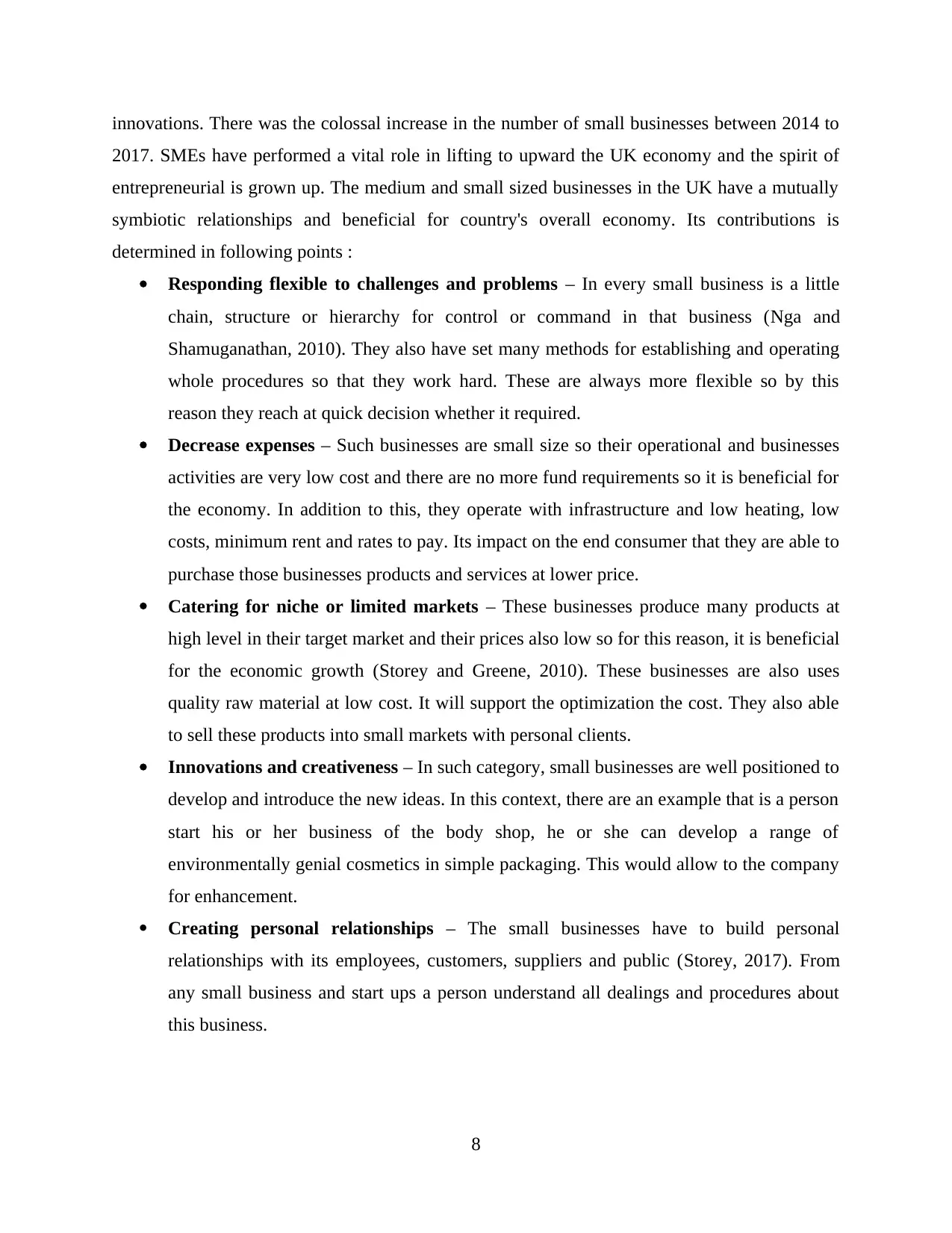
innovations. There was the colossal increase in the number of small businesses between 2014 to
2017. SMEs have performed a vital role in lifting to upward the UK economy and the spirit of
entrepreneurial is grown up. The medium and small sized businesses in the UK have a mutually
symbiotic relationships and beneficial for country's overall economy. Its contributions is
determined in following points :
Responding flexible to challenges and problems – In every small business is a little
chain, structure or hierarchy for control or command in that business (Nga and
Shamuganathan, 2010). They also have set many methods for establishing and operating
whole procedures so that they work hard. These are always more flexible so by this
reason they reach at quick decision whether it required.
Decrease expenses – Such businesses are small size so their operational and businesses
activities are very low cost and there are no more fund requirements so it is beneficial for
the economy. In addition to this, they operate with infrastructure and low heating, low
costs, minimum rent and rates to pay. Its impact on the end consumer that they are able to
purchase those businesses products and services at lower price.
Catering for niche or limited markets – These businesses produce many products at
high level in their target market and their prices also low so for this reason, it is beneficial
for the economic growth (Storey and Greene, 2010). These businesses are also uses
quality raw material at low cost. It will support the optimization the cost. They also able
to sell these products into small markets with personal clients.
Innovations and creativeness – In such category, small businesses are well positioned to
develop and introduce the new ideas. In this context, there are an example that is a person
start his or her business of the body shop, he or she can develop a range of
environmentally genial cosmetics in simple packaging. This would allow to the company
for enhancement.
Creating personal relationships – The small businesses have to build personal
relationships with its employees, customers, suppliers and public (Storey, 2017). From
any small business and start ups a person understand all dealings and procedures about
this business.
8
2017. SMEs have performed a vital role in lifting to upward the UK economy and the spirit of
entrepreneurial is grown up. The medium and small sized businesses in the UK have a mutually
symbiotic relationships and beneficial for country's overall economy. Its contributions is
determined in following points :
Responding flexible to challenges and problems – In every small business is a little
chain, structure or hierarchy for control or command in that business (Nga and
Shamuganathan, 2010). They also have set many methods for establishing and operating
whole procedures so that they work hard. These are always more flexible so by this
reason they reach at quick decision whether it required.
Decrease expenses – Such businesses are small size so their operational and businesses
activities are very low cost and there are no more fund requirements so it is beneficial for
the economy. In addition to this, they operate with infrastructure and low heating, low
costs, minimum rent and rates to pay. Its impact on the end consumer that they are able to
purchase those businesses products and services at lower price.
Catering for niche or limited markets – These businesses produce many products at
high level in their target market and their prices also low so for this reason, it is beneficial
for the economic growth (Storey and Greene, 2010). These businesses are also uses
quality raw material at low cost. It will support the optimization the cost. They also able
to sell these products into small markets with personal clients.
Innovations and creativeness – In such category, small businesses are well positioned to
develop and introduce the new ideas. In this context, there are an example that is a person
start his or her business of the body shop, he or she can develop a range of
environmentally genial cosmetics in simple packaging. This would allow to the company
for enhancement.
Creating personal relationships – The small businesses have to build personal
relationships with its employees, customers, suppliers and public (Storey, 2017). From
any small business and start ups a person understand all dealings and procedures about
this business.
8
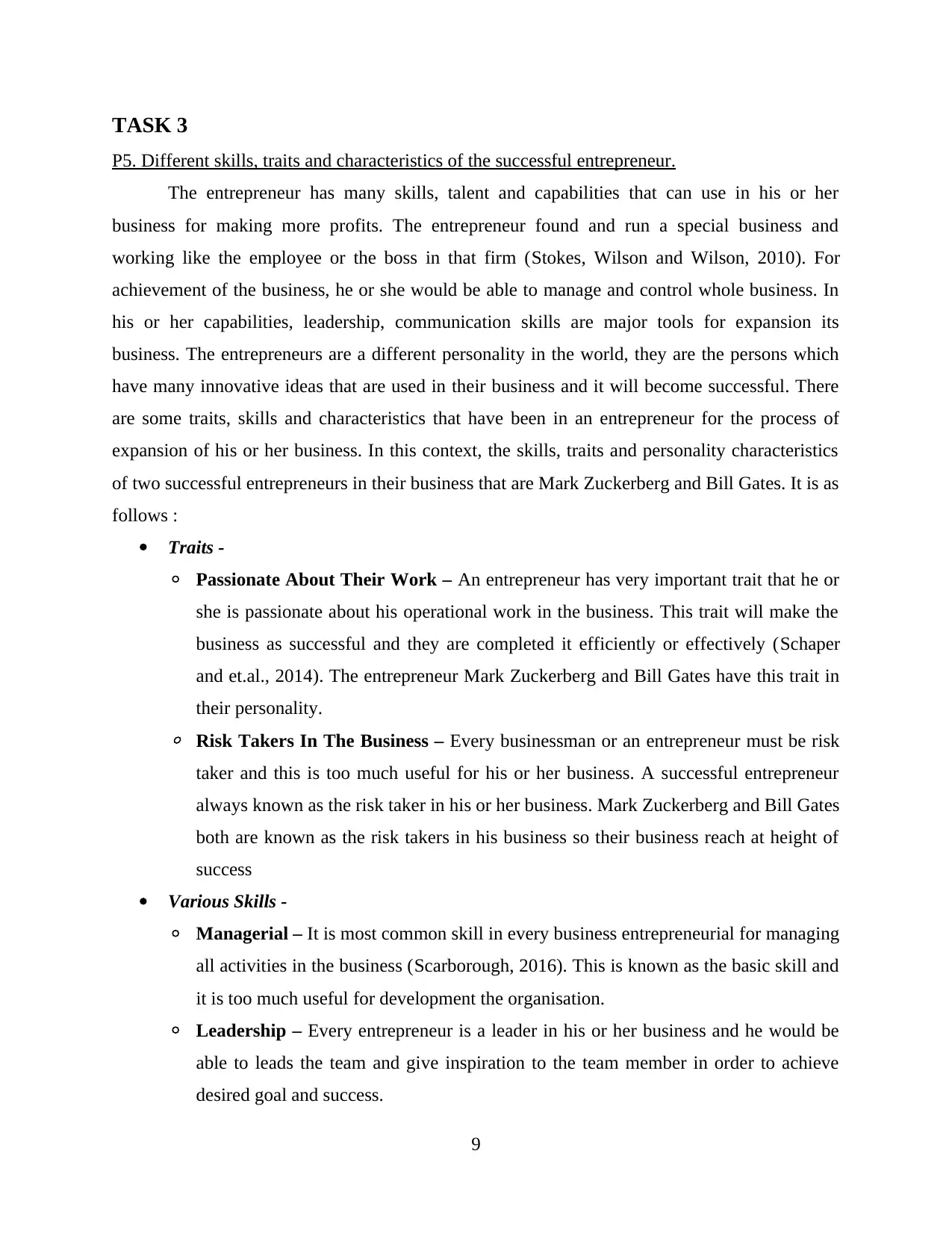
TASK 3
P5. Different skills, traits and characteristics of the successful entrepreneur.
The entrepreneur has many skills, talent and capabilities that can use in his or her
business for making more profits. The entrepreneur found and run a special business and
working like the employee or the boss in that firm (Stokes, Wilson and Wilson, 2010). For
achievement of the business, he or she would be able to manage and control whole business. In
his or her capabilities, leadership, communication skills are major tools for expansion its
business. The entrepreneurs are a different personality in the world, they are the persons which
have many innovative ideas that are used in their business and it will become successful. There
are some traits, skills and characteristics that have been in an entrepreneur for the process of
expansion of his or her business. In this context, the skills, traits and personality characteristics
of two successful entrepreneurs in their business that are Mark Zuckerberg and Bill Gates. It is as
follows :
Traits -
◦ Passionate About Their Work – An entrepreneur has very important trait that he or
she is passionate about his operational work in the business. This trait will make the
business as successful and they are completed it efficiently or effectively (Schaper
and et.al., 2014). The entrepreneur Mark Zuckerberg and Bill Gates have this trait in
their personality.
◦ Risk Takers In The Business – Every businessman or an entrepreneur must be risk
taker and this is too much useful for his or her business. A successful entrepreneur
always known as the risk taker in his or her business. Mark Zuckerberg and Bill Gates
both are known as the risk takers in his business so their business reach at height of
success
Various Skills -
◦ Managerial – It is most common skill in every business entrepreneurial for managing
all activities in the business (Scarborough, 2016). This is known as the basic skill and
it is too much useful for development the organisation.
◦ Leadership – Every entrepreneur is a leader in his or her business and he would be
able to leads the team and give inspiration to the team member in order to achieve
desired goal and success.
9
P5. Different skills, traits and characteristics of the successful entrepreneur.
The entrepreneur has many skills, talent and capabilities that can use in his or her
business for making more profits. The entrepreneur found and run a special business and
working like the employee or the boss in that firm (Stokes, Wilson and Wilson, 2010). For
achievement of the business, he or she would be able to manage and control whole business. In
his or her capabilities, leadership, communication skills are major tools for expansion its
business. The entrepreneurs are a different personality in the world, they are the persons which
have many innovative ideas that are used in their business and it will become successful. There
are some traits, skills and characteristics that have been in an entrepreneur for the process of
expansion of his or her business. In this context, the skills, traits and personality characteristics
of two successful entrepreneurs in their business that are Mark Zuckerberg and Bill Gates. It is as
follows :
Traits -
◦ Passionate About Their Work – An entrepreneur has very important trait that he or
she is passionate about his operational work in the business. This trait will make the
business as successful and they are completed it efficiently or effectively (Schaper
and et.al., 2014). The entrepreneur Mark Zuckerberg and Bill Gates have this trait in
their personality.
◦ Risk Takers In The Business – Every businessman or an entrepreneur must be risk
taker and this is too much useful for his or her business. A successful entrepreneur
always known as the risk taker in his or her business. Mark Zuckerberg and Bill Gates
both are known as the risk takers in his business so their business reach at height of
success
Various Skills -
◦ Managerial – It is most common skill in every business entrepreneurial for managing
all activities in the business (Scarborough, 2016). This is known as the basic skill and
it is too much useful for development the organisation.
◦ Leadership – Every entrepreneur is a leader in his or her business and he would be
able to leads the team and give inspiration to the team member in order to achieve
desired goal and success.
9
⊘ This is a preview!⊘
Do you want full access?
Subscribe today to unlock all pages.

Trusted by 1+ million students worldwide
1 out of 17
Related Documents
Your All-in-One AI-Powered Toolkit for Academic Success.
+13062052269
info@desklib.com
Available 24*7 on WhatsApp / Email
![[object Object]](/_next/static/media/star-bottom.7253800d.svg)
Unlock your academic potential
Copyright © 2020–2026 A2Z Services. All Rights Reserved. Developed and managed by ZUCOL.





